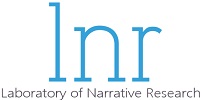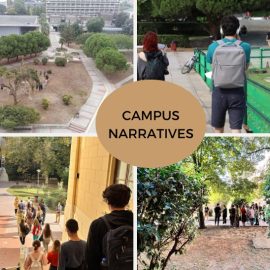The Laboratory of Narrative Research (LNR) is a teaching and research unit that is part of the School of English at Aristotle University of Thessaloniki. It has been designed to bring together scholars and researchers from across the humanities, the social sciences and other scientific fields who have a special interest in the workings and the politics of narrative production.
Lab Director: Dr Effie Yiannopoulou
2 ECTS credited
Please note that no ECTS will be credited to participants who have attended online classes without submitting assignments. In this case, participants will be provided with a Certificate of Attendance with no ECTS credited.
Section 1: Narratives of Being-in-the-World: Learning Interims
This section offers critical thinking/theoretical approaches and good teaching practices of how knowledge can become/transform into a tool for our re-visioning of the world. Participants’ varied backgrounds (cultural, familial, religious and others) turn into valuable and variable narratives for negotiation, intercession and communication.
1.1 Conviviality in Education: Interludes for Self-Improvement
Instructor: Emmanouilidou Sophia
What is conviviality? What do we mean by ‘convivial’ tools? What is a convivial interlude in a learning environment? This subsection/module draws from Ivan Illich’s philosophy of education and recasts the classroom as a liminal space where one can use the (in)validity of knowledge (facts, information, and skills) to attain self-improvement and write narratives of self-cognition.
Duration: 6 hours
Dates: 10 April, 11:00-14:00 and 11 April 11:00-14:00
Section 2: Narratives of ‘Glocal’ Change
‘Glocalization’ signals communication and/or integration whereby local knowledge informs universal intelligence/concern and vice versa. This section explores how the ‘glocal’ approach recognizes some of our common cultural/social/environmental values as citizens of a global village. Participants will analyze and produce narratives which accept difference and diversity.
2.1 Immigrant Narratives and the Multicultural Classroom
Instructor: Patrona Theodora
Stepping on George Lakoff’s discussions on the political mind, this module focuses on the diversity of the contemporary Greek school and the many challenges it faces. Examining a range of narratives (literary, musical, filmic etc.) we will introduce participants to basic notions of ethnic studies like identity and self- ascription, marginalization and inclusion, silencing and voicing Otherness. Through good teaching practices teachers of the multicultural classroom will receive useful tools to inspire cultural sensitivity, tolerance and empathy among their students.
Section duration: 6 hours
Dates: 17 April, 11:00-14:00 and 18 April 11:00-14:00
2.2 Testimonios: From Narratives of ‘I’ to Communal Identification
Instructor: Emmanouilidou Sophia
George Yúdice claims that testimonial writing is told by a speaking voice, ‘moved to narrate by the urgency of a situation.’ This module introduces participants to the strategies of testimonio writing by addressing/recording/representing some of the crises we face in life. Our aims are two-fold: Consciousness-raising and the possibilities of the (in)orderly transition from the individual perspective to a communal sense of being.
Section duration: 6 hours
Dates: 8 May , 11:00-14:00 and 9 May 11:00-14:00
Section 3: Sound Narratives and Digital Storytelling
What are digital stories? Can we convey emotions and/or share thoughts via media production techniques? Do sounds compile a meaningful sequence of events? This section looks into the narrative structures that sounds and multi-modal media create. Our focus is on how storytelling can switch from the written medium to sonic and digital expressions/means of communication. The three modules of this section offer numerous examples of good practice in a learning environment.
3.1 Digital Storytelling and the Arts
Instructor: Delikonstantinidou Aikaterini
New forms of storytelling have emerged since the arts took a digital turn. Both narratives native to the digital environment and narratives adopted by it increasingly manifest in multi/transmedia configurations involving diverse art forms. Participants will explore how emerging kinds, formats, and strategies of storytelling that draw on the arts change the way narratives are born and develop, as well as how narrative creation and distribution now influence our technoculture.
Section duration: 6 hours
Dates: 15 May , 11:00-14:00 and 16 May 11:00-14:00
3.2 Podcast Narratives in Class
Instructor: Ristani Maria
In the last few years (and especially since 2014), podcasts have been gaining considerable momentum across much of the English-speaking world. Audio-based storytelling—in decline for many years—seems now at a spin-off moment with more factual and non-factual podcasts being created, feeding on wide audiences to whom podcasters promise (and deliver) compelling “movies for [their] ears”. This module seeks a) to familiarize participants with the working logic, aesthetics and idiosyncrasies of the podcast medium, and b) to explore and experiment with possible ways for their effective use in the learning environment as a valuable tool for multisensory learning.
Section duration: 6 hours
Dates: 22 May , 11:00-14:00 and 23 May 11:00-14:00
3.3 Performing (in) the Digital
Instructor: Delikonstantinidou Aikaterini
Digital performances take place in sites as different as digital theatre, computer games, and Instagram stories. The cross-pollination of digital technologies, performing arts, and practices of performing life online informs conversations about the sociocultural implications of digital performances. Participants will investigate the aesthetics and politics of the latter, as well as the emerging needs and concerns they reflect on.
Section duration: 6 hours
Dates: 29 May, 11:00-14:00 and 30 May 11:00-14:00
Section 4: Of Convivial Interludes and Lasting Reflections
Participants will demonstrate in the form of in-class presentations the degree to which they have achieved the aims and objectives of the course. This section includes question-and-answer (Q&A) sessions during which participants will reflect on the theoretical/practical knowledge they have gained.
4.1 Class Presentations and Assembly Interactions
Instructors: Emmanouilidou Sophia, Ristani Maria, Patrona Thedora, Delikonstantinidou Aikaterini
Participants will present their individual work/creative writing. The aim of this module is to integrate theoretical and practical knowledge acquired in the course and to create channels of communication.
Final assessment includes the submission of portfolios comprising participants’ responses to separate modules. Participants will be scheduled for an online tutorial with the instructors during which the course’s objectives will be further discussed and the learning outcomes evaluated for future use in a learning environment. Feedback will be offered on the participants’ creative/reflective submissions.
Section duration: 6 hours
Date: 5 June, 10:00-16:00



